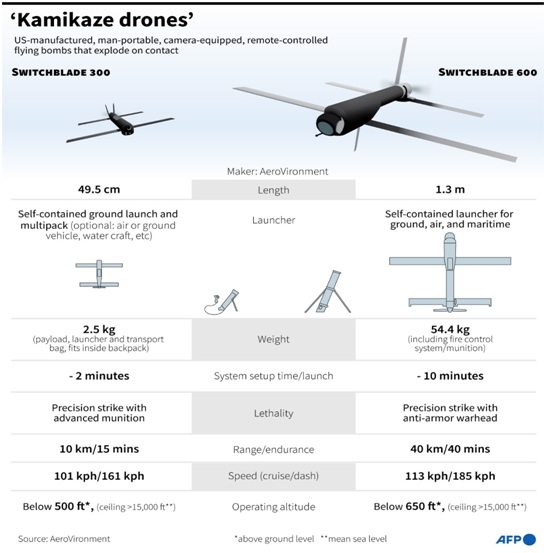US to send kamikaze drones to Ukraine
Days after Ukraine urged the US Congress for more military support to defend his country against Russia’s military operation, the US is likely to send killer or kamikaze drones as part of a massive military aid package.
Context
Days after Ukraine urged the US Congress for more military support to defend his country against Russia’s military operation, the US is likely to send killer or kamikaze drones as part of a massive military aid package.
What are Kamikaze drones?
- The Japanese word ‘kamikaze’ is associated with a Japanese special attack unit during World War II.
- The military pilots who were part of the unit would crash their fighter planes and perishing in the suicide mission while taking the enemy with them.
- Any use of the word kamikaze since World War II is associated with similar suicide missions.
- In the context of a drone, it is more of a robotic bomb that flies near the designated target until the time is right.
- In modern warfare, kamikaze drones are also known as loitering munitions or suicide drones.
- It can be considered a mix of guided cruise missiles and Unmanned Aerial Vehicles (UAV).
Countries possessing KamikazeAlthough the Kamikaze might be the most advanced form of this genre of drones, Russia, China, Israel, Iran and Turkey all have some version of it. |
Variants
- There are two variants of the weapon –
- the Switchblade 300: designed for pinpoint strikes on personnel
- the Switchblade 600: designed to destroy tanks and other armored vehicles
- These cutting-edge guided missiles can accurately target enemy troops from miles away.
- Equipped with cameras, guidance systems and explosives, the Switchblades are essentially robotic smart bombs.
- The drones can be programmed to fly to a target and can be steered around the objectives until the time is right to strike.
- The Switchblade 600 can loiter in the air for nearly 40 minutes at a distance of 25 miles, and then strike its target at up to 115 mph speed.
- The Switchblade 300, is less than 2-feet long and weighs nearly 2.5kg. It can be carried in a rucksack and can be launched from a small tube that resembles a mortar. It can fly for up to 15 minutes.
- Both the variants can be guided to the target using onboard sensors and GPS.


